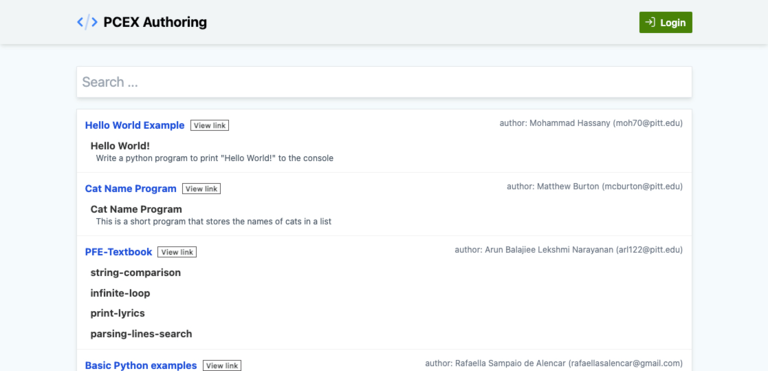Difference between revisions of "WEAT"
| Line 1: | Line 1: | ||
The '''Worked Example Authoring Tool (WEAT)''' is an innovative tool designed to facilitate the creation of worked examples for programming education through a ''human-AI collaboration'' approach. By integrating ChatGPT, WEAT assists instructors in generating line-by-line explanations for code examples in Java and Python. Instructors can provide the code and problem statement, and WEAT uses ChatGPT to generate explanations for each line of code. These explanations can then be reviewed, edited, and added into the worked examples, streamlining the process of creating educational programming materials. | The '''Worked Example Authoring Tool (WEAT)''' is an innovative tool designed to facilitate the creation of worked examples for programming education through a ''human-AI collaboration'' approach. By integrating ChatGPT, WEAT assists instructors in generating line-by-line explanations for code examples in Java and Python. Instructors can provide the code and problem statement, and WEAT uses ChatGPT to generate explanations for each line of code. These explanations can then be reviewed, edited, and added into the worked examples, streamlining the process of creating educational programming materials. | ||
| − | == Try WEAT == | + | ==Try WEAT== |
[http://adapt2.sis.pitt.edu/pcex-authoring/ <u>Click here</u>] to access the '''WEAT''', use your account credentials and login into the tool or create an account if you don't have one (''please send an email to Mohammad Hassany [[mailto:moh70@pitt.edu moh70@pitt.edu]] to activate your account''). | [http://adapt2.sis.pitt.edu/pcex-authoring/ <u>Click here</u>] to access the '''WEAT''', use your account credentials and login into the tool or create an account if you don't have one (''please send an email to Mohammad Hassany [[mailto:moh70@pitt.edu moh70@pitt.edu]] to activate your account''). | ||
Please [https://youtu.be/IOfA0Ql3Zq0 <u>watch this video tutorial</u>] or read the [[WEAT_Tutorial|<u>user manual</u>]] to learn more about our tool. | Please [https://youtu.be/IOfA0Ql3Zq0 <u>watch this video tutorial</u>] or read the [[WEAT_Tutorial|<u>user manual</u>]] to learn more about our tool. | ||
| + | |||
| + | ==WEAT Interface== | ||
[[File:weat_image8.png|768px]] | [[File:weat_image8.png|768px]] | ||
Revision as of 21:33, 6 April 2024
The Worked Example Authoring Tool (WEAT) is an innovative tool designed to facilitate the creation of worked examples for programming education through a human-AI collaboration approach. By integrating ChatGPT, WEAT assists instructors in generating line-by-line explanations for code examples in Java and Python. Instructors can provide the code and problem statement, and WEAT uses ChatGPT to generate explanations for each line of code. These explanations can then be reviewed, edited, and added into the worked examples, streamlining the process of creating educational programming materials.
Try WEAT
Click here to access the WEAT, use your account credentials and login into the tool or create an account if you don't have one (please send an email to Mohammad Hassany [moh70@pitt.edu] to activate your account).
Please watch this video tutorial or read the user manual to learn more about our tool.
WEAT Interface
Worked Example Authoring Tool: Hub Page.
Publications
- Hassany, M., Brusilovsky, P., Ke, J., Akhuseyinoglu, K., and Lekshmi Narayanan, A. B. (2023) Authoring Worked Examples for Java Programming with Human-AI Collaboration, Report No. arXiv:2312.02105, arXiv.
- Hassany, M., Brusilovsky, P., Ke, J., Akhuseyinoglu, K., and Lekshmi Narayanan, A. B. (2024) Human-AI Co-Creation of Worked Examples for Programming Classes. In: Proceedings of 5th Workshop on Human-AI Co-Creation with Generative Models (HA-GEN 20224) at IUI 2024, Greenville, SC, USA, March 18, 2024.
- Hassany, M., Brusilovsky, P., Ke, J., Akhuseyinoglu, K., and Lekshmi Narayanan, A. B. (2024) Authoring Worked Examples for Java Programming with Human-AI Collaboration. In: Proceedings of ACM/SIGAPP Symposium on Applied Computing, SAC 2024, Avila, Spain, April 8-12, 2024.

